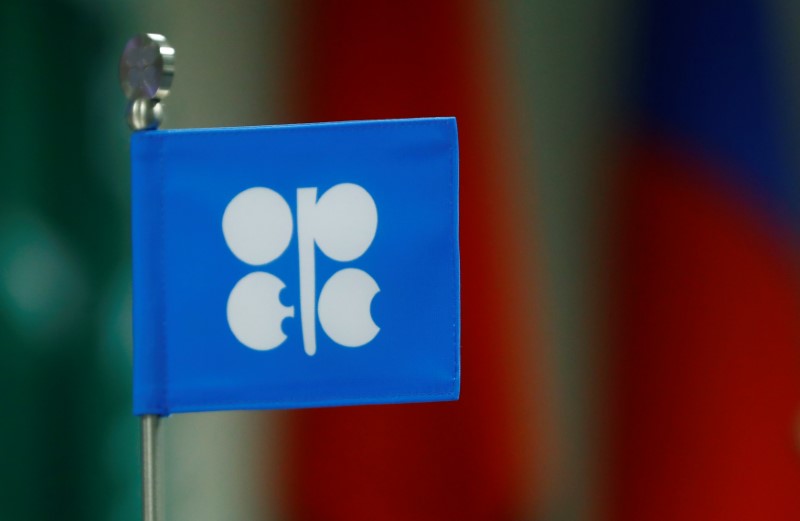 © Reuters. A flag with the Organization of the Petroleum Exporting Countries (OPEC) logo is seen during a meeting of OPEC and non-OPEC countries in Vienna
© Reuters. A flag with the Organization of the Petroleum Exporting Countries (OPEC) logo is seen during a meeting of OPEC and non-OPEC countries in ViennaBy Rania El Gamal
DUBAI (Reuters) – OPEC is likely to stay the course by keeping its current curb on oil production in place for the whole of 2018 despite potential output disruptions next year, Gulf OPEC sources said.
The Organization of the Petroleum Exporting Countries, plus Russia and nine other producers, have cut overall output by about 1.8 million bpd since January. The pact runs to March 2018, but the producers are considering extending it.
OPEC is scheduled to next meet at its headquarters in Vienna on Nov. 30.
Venezuela’s oil production, which has been falling by about 20,000 barrels per day per month since last year, is on track to fall an additional 240,000 bpd next year as U.S. sanctions and a lack of infrastructure investment hobbles operations.
Oil flow from other OPEC members such as Nigeria and Libya continue to see supply disruption.
But Saudi Arabia and OPEC are unlikely to raise output elsewhere next year to compensate for this decline as the exporting group wants to remain focused on reducing the level of oil stocks in OECD industrialized countries to their five-year average, one OPEC source familiar with Saudi thinking on its oil policy said.
“OPEC is likely to stay the course for the rest of 2018. We want to see commercial stocks going down,” the source said.
Another OPEC source said there was a high risk of a supply drop from Venezuela next year but that does not necessarily mean that OPEC will raise output elsewhere to make up for the decline.
The first OPEC source said that output from the Latin American OPEC nation could fall in 2018 by 300,000-600,000 bpd, adding that the risk of supply disruptions from other OPEC producers such as Libya and Nigeria also remained high.
“The feeling in OPEC is that $60 (a barrel) should be the floor for oil prices next year,” the first source said.
The market has been concerned that once the supply cut deal comes to an end producers will increase supplies again, causing prices to fall.
But Saudi Energy Minister Khalid al-Falih last week raised the prospect of prolonged restraint once the pact ends, as the world’s top oil exporter Saudi Arabia is determined to reduce inventories further through the OPEC-led deal.
Saudi Crown Prince Mohammad bin Salman told Reuters last week that the kingdom supports the idea of extending the OPEC-led pact.
Fusion Media or anyone involved with Fusion Media will not accept any liability for loss or damage as a result of reliance on the information including data, quotes, charts and buy/sell signals contained within this website. Please be fully informed regarding the risks and costs associated with trading the financial markets, it is one of the riskiest investment forms possible.
Source: Investing.com



























